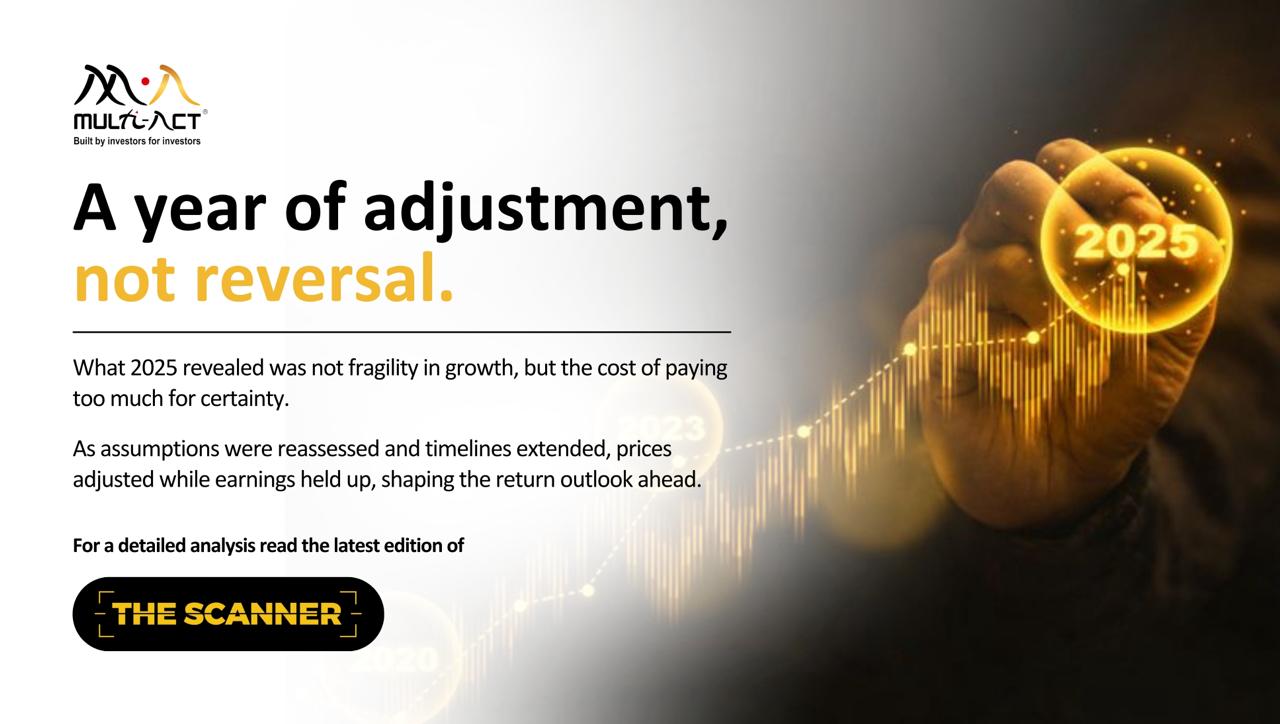
The Scanner, Jan’26 | Gold and Silver : Opportunity or overheating?
When prices rise very quickly, they often pause, or correct. In such moments, slowing down and staying … Continued
Read more3 October 2024

“Travelling shows you the map, diving shows you the treasure.”
Over 70% of our planet lies beneath the ocean’s surface, a realm most of us have only glimpsed through films. I ventured beyond the screen last year, earning my certification as an Advanced Open Water Diver, now qualified to dive up to 30 metres deep— the equivalent of a 12-storey building underwater. Beneath the waves, the sea is alive with an extraordinary tapestry of colours: neon blues, vivid yellows, and inky blacks paint fish, plants, and caves in a visual spectacle. Since my training in the Arabian Sea, I’ve been mesmerised—often finding myself dreaming of diving again. As Jacques Cousteau said, “The sea, once it casts its spell, holds one in its net of wonder forever.” Indeed, I’m hooked.
But being an equity investor for over two decades, I’ve come to realise how diving and investing mirror life itself. Millions of market participants make decisions influenced by their experiences, just as a diver navigates the underwater world with the tools and experiences they carry with them. Both require mastering a series of unique skill sets and surprisingly, there are striking similarities between the two.
Safety First: The Golden Rule of Diving and Investing
Why dive into the sea? For some, it’s to swim with turtles, explore shipwrecks, or retrieve lost treasures. Whether searching for big fish or tiny crabs, every diver shares one primary goal: to return safely. All other objectives are secondary.
In investing, participants enter with various aspirations. Some chase rapid wealth: others prefer to profit from the impatience of the former. But the one principle a prudent investor must hold paramount is to protect capital. All other goals, much like a diver’s secondary aims, come after this primary objective.
The Value of Preparation
Scuba diving demands thorough preparation. How deep will you go? How long will you stay submerged? What gas will you use? Just before jumping in, we check each other’s gear—ensuring everything is in working order. This process can separate a tranquil dive from a dangerous one.
In investing, the markets are unpredictable, and the only lifeline you have is solid research and analysis. Much like following a defined process before a dive, understanding the risks, and returns, and following a robust process is critical before leaping into an investment.
Diversification: A Lifeline in Both Realms
Diving relies on the ‘buddy system’—you pair up, keeping an eye on each other. Every diver’s tank has a spare regulator in case of an emergency, and we communicate about potential dangers or hidden wonders, ensuring the dive is enjoyable and safe.
In investment, diversification plays a similar role. When one asset class takes a hit, others can cushion the blow. Spreading your risk across different asset types, with varying returns and volatilities, helps ensure smooth sailing through market turbulence.
Patience Pays: A Long-Term Perspective
There’s no race in diving. In fact, during stressful moments like running low on oxygen, the advice is to slow down. Quick, panicked movements increase your heart rate and burn through precious oxygen faster. A skilled diver moves smoothly and deliberately.
Investing, too, rewards those with patience. Many new investors are drawn to the allure of quick gains, chasing after ‘multi-baggers’. However, taking on excessive risk often leads to losses. Success comes to those who adopt a long-term view, not those always chasing the next big thing.
Crisis Management: Staying Calm When the Tide Turns
Underwater, emergencies happen—a regulator might be knocked from your mouth, or your tank might get snagged on seaweed. In these moments, the mantra is: Dive first, situation second, communicate third. Ensure you’re floating properly, adjust your gear, and breathe steadily. Only then do you address the issue and communicate with your dive buddy if necessary.
In investing, when market euphoria or panic sets in, many investors do the opposite. They rush to social media, react impulsively, and fail to check their initial investment logic. A prudent investor first checks the fundamentals—are the assets in their portfolio sound? Only then do they assess the situation calmly, deciding whether any action is needed. Communicating with others, while useful, should come last.
A classic example occurred during the recent Lok Sabha elections, where the market jumped 3% on hopes of a clear majority, only to fall 6% the next day when that didn’t materialise. Within a week, it corrected itself. For a long-term investor, the wisest move during such times is often to filter through the noise around, sit tight and weather the storm.
The Big Picture: Staying the Course in Choppy Waters
Just as in diving, the key to successful investing lies not in chasing thrills or reacting to every ripple but in staying calm, prepared, and focused on the bigger picture. Whether navigating the vibrant depths of the ocean or the volatile waves of the market, it’s the balance of risk, patience, and skill that leads to meaningful exploration and lasting rewards. So, next time you face choppy waters—be it financial or underwater—remember to trust your preparation, protect your capital, and keep your eye on the horizon.
About the author
Aniruddha Meher, M.Phil. (Stat), CFA
Associate Director, Sr. Portfolio Manager at Multi-Act
With two decades of investment experience, Aniruddha has been at the helm of the Sankhya India Portfolio since its inception. A statistician by training, with an M.Phil. in Statistics from Pune University and a CFA, Aniruddha is a founding member of Multi-Act’s Quant team, where he leads a team of five expert statisticians in navigating complex market data and trends. Aniruddha enjoys adventures such as motorcycling and scuba diving where he believes the risks can be controlled.
Statutory Disclosure: Portfolio Manager – Multi-Act Equity Consultancy Private Limited (Registration No. INP000002965)
Disclaimer: This Article and the views expressed therein has been made solely for information and educational purpose only. This Article do not constitute a distribution, an endorsement, an investment advice, an offer to buy or sell or the solicitation of an offer to buy or sell any securities or any other investment products/strategies or an attempt to influence the opinion or behaviour of the Investors/Recipients.
The statements made herein may include statements of future expectations and other forward-looking statements that are based on our current views and assumptions and involve known and unknown risks and uncertainties that could cause actual results, performance or events to differ materially from those expressed or implied in such statements. Past performance may or may not be sustained in future and should not be used as a basis for comparison with other investments. MAECL does not provide any guarantee/assurance of any minimum or maximum returns. Investment in Securities is subject to market and other risks and there is no assurance or guarantee that the objectives of any of the Strategies of Portfolio Management Services will be achieved.
The information is prepared on the basis of publicly available information, internally developed data and other sources believed to be reliable. MAECL does not solicit any course of action based on the information provided by it and the investor is advised to exercise independent judgment and act upon the same based on its/his/her sole discretion based on their own investigations and risk-reward preferences.
The information is meant for general reading purpose, understanding of intended recipient and is not meant to serve as a professional guide and/or the same should not at any point of time be construed to be an invitation to invest in any investment securities / products.
MAECL, its associates or any of their respective directors, employees, affiliates or representatives do not assume any responsibility for, or warrant the accuracy, completeness, adequacy and reliability of such information and consequently are not liable for any decisions taken based on the same. This information is not intended to be an offer or solicitation for the purchase or sale of any security or financial product. The investor shall at all times keep such information / data and material provided by MAECL strictly confidential and will not use, share or disclose such information to any third party.
It is stated that, as permitted by SEBI Regulations and the Company’s Employee Dealing Policy, MAECL and/or its associates, affiliates and/or individuals thereof may have positions in securities referred to in the information provided by it and may make purchases or sale thereof while the information is in circulation. MAECL is not responsible for any error or inaccuracy, or any losses suffered on account of any information contained in this document. Neither MAECL nor any of its associates, directors, employees, affiliates or representatives shall be liable for any direct, indirect, special, incidental, consequential, punitive or exemplary damages, including lost profits arising in any way from the information provided by it.
For additional Disclosures and Disclaimers, please visit https://multi-act.com/

When prices rise very quickly, they often pause, or correct. In such moments, slowing down and staying … Continued
Read more
2025 did not challenge growth. It challenged assumptions. As expectations moved ahead of actual delivery, prices adjusted … Continued
Read more
Macro numbers alone rarely tell the full story. When jobs, consumption, credit, and inflation are considered together, … Continued
Read moreReceive monthly updates by signing up to our newsletter.
|
Sr. No. |
Received from |
Pending at the end of last month |
Received |
Resolved* |
Total Pending # |
Pending complaints > 3 months |
Average Resolution time^ (in days) |
|
1 |
Directly from Investors |
0 |
0 |
0 |
0 |
0 |
0 |
|
2 |
SEBI (SCORES) |
0 |
0 |
0 |
0 |
0 |
0 |
|
3 |
Other Sources (if any) |
0 |
0 |
0 |
0 |
0 |
0 |
|
|
Grand Total |
0 |
0 |
0 |
0 |
0 |
0 |
Number of complaints received during month against the IA due to impersonation by some other entity:
Note: In case of any complaints received against the IA due to impersonation of the IA by some other entity, the IA may adjust the number of such complaints from total number of received/resolved complaints while preparing the above table. Further, IA must close such impersonation related complaints after following the due process as specified by SEBI/ IAASB.
* Inclusive of complaints of previous months resolved in the current month.
# Inclusive of complaints pending as on the last day of the month
^ Average Resolution time is the sum total of time taken to resolve each complaint in days, in the current month divided by total number of complaints resolved in the current month.
|
Sr. No. |
Month |
Carried forward from previous month |
Received |
Resolved* |
Pending# |
|
1 |
April, 2025 |
0 |
0 |
0 |
0 |
|
2 |
May, 2025 |
0 |
0 |
0 |
0 |
|
3 |
June, 2025 |
0 |
0 |
0 |
0 |
|
4 |
July, 2025 |
0 |
0 |
0 |
0 |
|
5 |
August, 2025 |
0 |
0 |
0 |
0 |
|
6 |
September, 2025 |
0 |
0 |
0 |
0 |
|
7 |
October, 2025 |
0 |
0 |
0 |
0 |
|
8 |
November, 2025 |
0 |
0 |
0 |
0 |
|
9 |
December, 2025 |
0 |
0 |
0 |
0 |
|
10 |
January, 2026 |
0 |
0 |
0 |
0 |
|
|
Grand Total |
0 |
0 |
0 |
0 |
*Inclusive of complaints of previous months resolved in the current month. #Inclusive of complaints pending as on the last day of the month.
|
SN |
Year |
Carried forward from previous year |
Received |
Resolved* |
Pending# |
|
1 |
2021-22 |
0 |
0 |
0 |
0 |
|
2 |
2022-23 |
0 |
0 |
0 |
0 |
|
3 |
2023-24 |
0 |
0 |
0 |
0 |
|
4 |
2024-25 |
0 |
0 |
0 |
0 |
|
|
Grand Total |
0 |
0 |
0 |
0 |
*Inclusive of complaints of previous years resolved in the current year. #Inclusive of complaints pending as on the last day of the year.